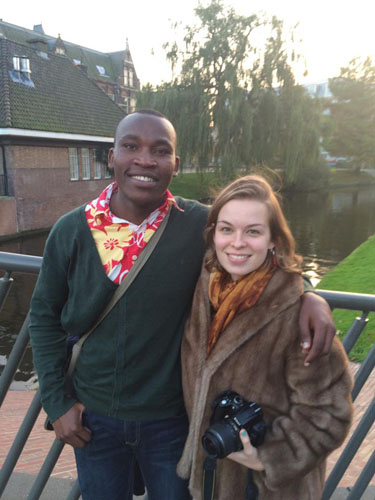Beyond Orphanages
John was the first child to be rescued and supported by Stahili and is currently the oldest student in the programme. Now aged 22 and studying at a high school in Nairobi, John has hopes of starting a university degree in the near future. Thanks to Stahili, John is now on his way towards a much brighter future through education. But for John, it has been a long and painful journey out of poverty and a life of abuse in an orphanage.

Stahili volunteer Marina Oliver-Tomic met and interviewed John during his visit to The Hague last year. In this post she reflects on John’s inspirational story and why Stahili, along with other organisations, fights to end child labour, neglect and abuse in orphanages and promotes family and community based alternatives which are more likely to give children the long-term education and the future they deserve.
I first met John, the oldest of the 30 children supported by Stahili in Kenya, and heard his inspirational story when he came to The Hague in October 2014, thanks to the support of Stahili and the International School of The Hague. Meeting John confirmed for me the dangerous and largely detrimental effects that orphanages have on children’s well-being. John’s story is no exception, as it appears to be the unfortunate rule for hundreds of thousands of children, most of whom are hidden from view as they have no one to speak for them. Instead of making it his demise, John used his experiences of exploitation to shape the way he grew. On meeting him, I was struck by his positive demeanor. When he spoke, he shone, and he was not ashamed of speaking about his horrific experiences.
John became an orphan at the age of six, despite having once been part of a family of six children. His father left when he was three months old, and his mother died from diabetes when he was eight. After his eldest sister got a job as a house maid in another village, and his other siblings left home, John went to live in a nearby forest, living rough and sleeping under a tree in a porcupine’s hole for several years. His feet became damaged from the rough dirt. He survived by stealing unripened bananas, casava and sugarcane from other people’s farms.
John’s status as an ‘orphan’ meant he had no formal opportunity to go to school. One day, when he was thirteen years old, he was fishing in a lake for food, with the hope of scraping together some money to buy clothes and food. As he waded in the water, he observed a group of children walking along the road. They were wearing school uniforms and carrying books. John asked himself: ‘How come they can go to school, and I cannot?’ At that moment, he resolved to make a positive change in his life and decided he would try to get an education. After a series of refusals and setbacks, he attended a local missionary school and with the help of a nun, he was enrolled in class 1, and eventually reached class 5.
Despite this positive change in his life, when John was in class 5, he found himself ensnared in the abusive and exploitative world of a for-profit orphanage. The man who owned the orphanage took John under his wing, tricking him into thinking that he would be helped and offered shelter. The reality was very different. Despite the owner vowing that he would pay John’s school fees, John was forced to work in the orphanage without being provided with any accommodation. John spent years helping with a variety of duties, including cleaning out cow sheds, milking cows, washing dogs, and preparing chapatis and other food for the orphanage’s forty children (all younger than him) and ten staff members daily. In this corrupt institution, money sent by donors from abroad for orphans was pocketed by the owner, and volunteers were given a false image of what was really going on behind the scenes, including the hidden exploitation of John. During all this time, John still found the energy to walk the 5km to school, but did not have time to do his homework when he came back to the orphanage.
It is estimated that there are approximately eight million children living in orphanages in the world today. According to Georgette Mulheir from the NGO Lumos, which works to end the existence of orphanages globally, children who grow up in orphanages do not assimilate into society as much as children who grow up in a family-oriented environment. In reality, children living in orphanages can find themselves on a destructive path, 40 times more likely to get a criminal record and ten times more likely to be involved in prostitution (as referenced in Georgette Mulheir’s TED talk).
Children placed in orphanages – whether strictly speaking ‘orphans’ or not – are often denied n the love and care that a (foster) family or a loving community can provide. Without this support, children need to fend for themselves, forcing them to become independent too soon. John experienced this, learning to become self-sufficient at an early age when he became homeless. Mulheir believes that investment in a local family-oriented support system would in the long run see governments saving money and resources that are today spent on institutions like orphanages.
Stahili Foundation is one organisation that is using a local-based approach to support children, by providing funds through a donor system. Using the positive social structures already in place in the community – such as family-oriented networks – Stahili empowers the children’s families and guardians and enables full-time education in schools for the children. With individual and collective donors, Stahili has been able to raise approximately 50,000 euro, since it began two years ago to provide for these children. In addition to supporting post-secondary education, this money also helps to provide access to medical support, food, clothing, hygiene needs and shelter.

When I think of John, I do not think of him as the labourer in the cow shed, or the violence and exploitation which marked his early life. Instead, I think of him as a proud young man and a born leader who deserves an education.
~Marina Oliver-Tomic, Volunteer & Supporter of Stahili Foundation